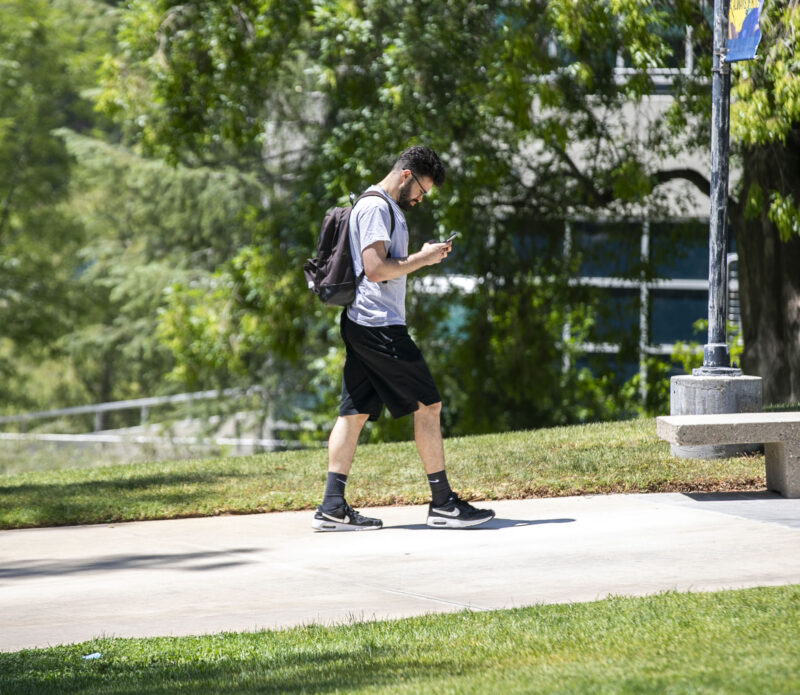Community colleges across California have been dealing for a few years with what has been described as “financial aid fraud” — and College of the Canyons is one of them, according to a college official.
The issue is statewide across the 116 campuses under the California Community College umbrella, according to Eric Harnish, spokesman for COC. He added that the issue is more prevalent at the community college level due to anyone being allowed to enroll, and has been going on for three to four years.
“There hasn’t necessarily been an uptick recently, but the effort has gotten more sophisticated,” Harnish said in a phone interview. “People are developing computer programs to submit applications for multiple non-existing students.”
According to CalMatters, a nonprofit and nonpartisan news organization covering issues across California, “fake community college students have stolen more than $10 million in federal financial aid and more than $3 million in state aid in the last 12 months.” Federal legislators have recently called upon U.S. Education Secretary Linda McMahon and U.S. Attorney General Pam Bondi to investigate the fraud.
Melissa Villarin, a communications specialist with the state Chancellor’s Office, said no representative of the office would be available for a phone interview, but Villarin did provide information via email.

Villarin wrote in an email, sent on behalf of the Chancellor’s Office, that “financial aid fraud is extremely low relative to the amount of aid disbursed.” According to state data, approximately $3.56 billion in financial aid was provided in the fall of 2023 and the spring of 2024 combined.
“The California Community Colleges remain committed to combating enrollment-related fraud issues with the utmost urgency,” the spokesperson wrote. “Our focus is to protect our colleges and students from criminals trying to exploit our system while ensuring we remain accessible and available to all potential students. This fraudulent activity is an ongoing process that evolves as bad actors continue to shift their attacks and use more sophisticated techniques.”
At COC, the fraud has led to some classes being canceled, though Harnish said the exact number is unknown, and low-enrolled classes are typically canceled before they begin so that students can find another class to enroll in. Online classes are the main ones being affected, though some in-person classes have also seen potential fraud, Harnish added.
It’s an issue that Harnish said college officials are constantly monitoring. But with fraudsters also evolving their tactics, “It’s something that we’re going to be dealing with for the foreseeable future.”
How the fraud occurs
The first step in applying to a community college in California is through the CCC Apply portal. From there, the state Chancellor’s Office uses a screening process to “weed out bad actors,” Harnish said, before forwarding applications to the individual colleges.
But that doesn’t mean fraudulent applicants can’t get through the system.

The main sources of the fraud, Harnish said, are through the California College Promise Grant and the Pell Grant, which is run through the federal government.
“It gives you an idea of the sophistication and the effort that goes into this,” Harnish said, referring to tax return statements being needed to apply for grant funding.
Applicants will typically apply through the CCC portal and then attempt to receive grant funding after being enrolled at a community college. But once the first installment of the grant funding is sent out — typically the second week of a semester, Harnish said — the fraudulent students disenroll without having to give back the grant funding.
COC students are allowed to enroll and disenroll in classes freely through the first two weeks of a semester.
Most of that fraud is seen in online classes, but Harnish said people have also started to attempt to commit fraud using in-person classes. That entails much of the same process as the online enrollment, but the fraudulent student simply does not show up to class and the hope is to not be dropped by the professor before the grant funding is disbursed, he said.
“We’re working to do whatever we can to prevent it,” Harnish said. “We take it very seriously. We have a task force of administrators, faculty and staff to share information and best practices, and coordinate across departments to make every effort we can to prevent it. But the benefit of our community college system in California is that it’s easy access and low cost. Unfortunately, it’s been abused by people for malicious purposes.”
How the fraud is combated
In the fall of 2024, COC had 20,270 total students, with 14 of them suspected of being “bad actors,” a number that could be higher were it not for the prevention measures being taken, Harnish said.
“If we didn’t do any verification, then the numbers would be inflated,” Harnish said in reference to the relatively low number of students suspected of fraud compared to the total number of enrolled students. He added that there was no known proof that those 14 students were committing enrollment fraud, only that they fit the criteria as students who were unverified, and those students all left COC before the semester ended.

Of the total student population in the fall, 7,027 students at COC received financial aid.
Across the CCC, the state Chancellor’s Office reported that of the 1.8 million applicants in the 2023-24 school year, just over 800,000 students actually enrolled, though the spokesperson wrote that there are numerous reasons for the million who don’t enroll, none of which have to do with enrollment fraud:
- Students do not need to apply every term, only for their first term or if they switch institutions or their enrollment has a gap of more than a year.
- Some students apply but are then accepted into a four-year university, or they are high school students who must apply due to a college and career readiness program requirement.
- Students may be enrolling and disenrolling if they are from underrepresented communities; are low-income; work full-time; are unhoused; or have parents or children who need care at home.
But for those applicants who are attempting to commit fraud, the state has evolved its system to combat “bad actors.”
“Initially, efforts focused on identifying gaps in the application system and enhancing fraud monitoring capabilities,” Villarin wrote on behalf of the state Chancellor’s Office. “Over time, these measures have evolved to include advanced technologies such as artificial intelligence for pattern recognition and identity verification. For example, the integration of identity verification technology has significantly improved the security and integrity of the student application process by requiring valid identification documents for verification. These continuous upgrades have resulted in a substantial reduction in confirmed fraudulent applications, ensuring that time and resources are used helping real students and maintaining the integrity of the admissions process.”
Harnish said combating fraud can be tricky at times because it is sometimes hard to know if a student is genuinely unable to come to class for the first week, or if that student is attempting to commit fraud.

“There’s that shared similarity with someone who is trying to commit enrollment fraud, but we don’t know,” he said.
While Harnish wouldn’t divulge everything that COC uses to combat the fraud, he did say that approximately a third of the 16,457 prospective applicants in the spring of 2025 were flagged for suspected fraud, leaving 10,000 to move forward with the process. Of those, another third were flagged for verification, which involves asking the applicant for some or all of the following:
- Verification worksheet.
- Driver’s license or other state-issued ID.
- Social Security card.
- Statement of education purpose, which has always been around but is now more commonly being submitted in person to make it easier to identify fraud.
The idea, Harnish said, is to keep fraudulent students from gaining access to classes so that enrollment numbers reported to the state don’t have to be cured, though that process does take place as needed.
More recently, COC has implemented an enrollment fraud task force, aimed at preventing the fraud in three ways:
- Dropping unverified students from course rosters and wait lists before the semester begins.
- Changing the registration cycle in order to shorten the window for open registration, making applicants complete all of the necessary steps, such as orientation and advisement) before they can register.
- Implementing new software to automate some of the application evaluation, allowing COC to evaluate applications more quickly.
“This has been an ongoing problem, so there’s no single answer or silver bullet,” Harnish said. “This is something we will continue to contend with, and we will be adapting and changing and continuing our efforts to guard against this moving forward.”
How personnel are affected
While technology is being used more frequently to combat enrollment fraud, Harnish said there is still a fair amount of work that has to be done.
Employees in the admissions, financial and IT offices, to name a few, all take some part in attempting to identify potential fraudulent applications.
“We would all prefer to be focusing our efforts on helping students who are here to benefit from what the college has to offer,” Harnish said. “This absolutely takes time away from doing that … It’s a big challenge. With the thousands of applications that are submitted each semester, of those that are deemed questionable for some reason, we have staff members looking at those individually, trying to determine if they are real or not.”

Then there are the actual professors who have to wonder if an enrolled student is simply unable to make class for the first week, or if that person never intended to ever be in class.
“Faculty are concerned,” Harnish said. “That concern is found across the board. It’s a concern that everyone shares.”
What happens when someone is caught?
Both Harnish and the state Chancellor’s Office decried the criminal act of enrolling in community college courses for the purpose of fraudulently attaining financial aid money.
Anyone who is caught receiving that aid fraudulently has a hold put on their record, a collections process is started, and the act is reported to the FBI, Harnish said.
“It’s their responsibility after that,” Harnish said.
A public records request submitted by CalMatters found that in June 2022, an investigation was opened by the federal Department of Education into a fraud ring at Los Angeles Harbor College and West Los Angeles College. At least 57 individuals were using false identities to steal more than $1.1 million in federal aid and loans over the prior four years, according to CalMatters.
The federal DOE also alerted the FBI to a fraud ring connected to L.A. City College, in which over $1 million was potentially fraudulently obtained using the identities of 70 different people, CalMatters reported.
State Assemblywoman Blanca Rubio, D-West Covina, recently sent a letter to the state’s Joint Committee on Legislative Audit requesting support to “audit the impact of fraudulent students, including bots, on California’s community colleges, students, and faculty.”








